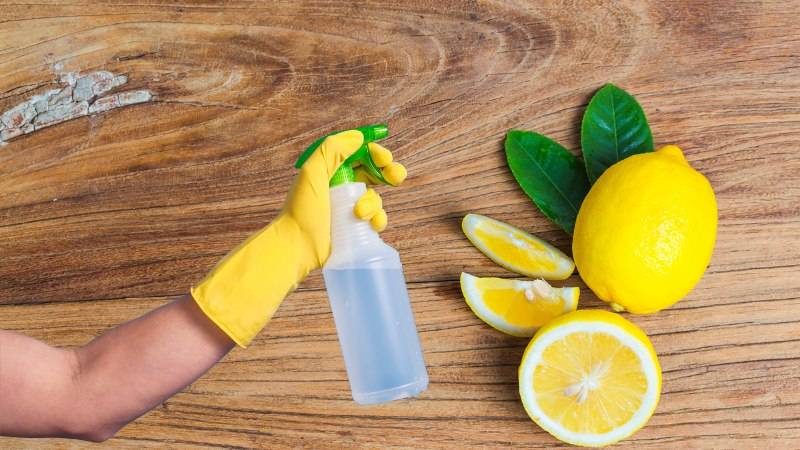I’ll never forget the day I stumbled upon a jar of citric acid at a quaint farmer’s market. Little did I know, this unassuming powder was a cleaning powerhouse.
As I’ve grown more environmentally conscious, finding non-toxic and sustainable cleaning options has become my passion. Citric acid cleaners emerged as a brilliant solution, merging effectiveness with eco-friendliness.
This guide is a toast to those who, like me, believe in keeping their homes spotless while honoring Mother Earth. Join me as we explore the wonders of citric acid, a simple ingredient with extraordinary cleaning capabilities.
What is Citric Acid?
Citric acid is an organic acid that is primarily sourced from citrus fruit. You’ll also find it in lower concentrations in other fruit and vegetables, but lemons and oranges are the most common sources of it.
If the term “acid” concerns you, it’s important to note that this is a weak acid and is in no way harmful to human health when used in the right way.
In fact, citric acid is commonly used in the food industry, so it’s even safe to ingest.

As a chelating agent, it can bind to metals, and that powerful effect allows us to use it as an effective cleaning agent.
You can easily mix up a citric acid cleaning solution by dissolving citric acid powder in warm water. All you need to do is mix a tablespoon with a pint of water, and you’re ready to go for this zero waste cleaning solution.
If you have an empty spray bottle from all-purpose cleaners, then simply fill it with your DIY citric acid cleaner, and you’ll be able to use it to clean and disinfect every part of your home.
How to Prepare a Citric Acid Cleaning Solution
Crafting your citric acid cleaning solution is an exercise in simplicity and adaptability, embodying the essence of DIY cleaning recipes. This all-purpose citric cleaner is not just effective; it’s a testament to sustainable living practices.
Necessary Ingredients
To embark on this eco-friendly cleaning adventure, you’ll need:
- Pure citric acid powder, readily available at health stores or online.
- Distilled water, to ensure the solution’s longevity without the minerals found in tap water.
- A spray bottle for easy application.
- Essential oils like lavender or tea tree for added antibacterial properties and a pleasant scent (optional).
For varying cleaning strengths:
- Light cleaning: Substitute citric acid with white vinegar for less abrasive tasks.
- Heavy-duty: Add baking soda to the mix for an extra kick against stubborn stains.
Mixing Instructions
- Begin with one part citric acid to two parts distilled water for a standard solution. This ratio can be adjusted depending on the task at hand.
- In a non-metallic bowl, gradually add citric acid to the water, stirring with a plastic or wooden spoon to avoid any reaction with metal.
- Once fully dissolved, funnel the solution into your spray bottle, adding a few drops of essential oil if desired.
- Label your bottle for safety and future reference.
Remember, a patch test is prudent for new surfaces—spritz a little on an inconspicuous area first. With these steps, you’ll have a versatile, eco-conscious cleaner at the ready for a multitude of household tasks.
How to Use Citric Acid for Cleaning
Here are 10 of the best uses for citric acid.
1. Deep-Cleaning Your Kettle and Coffee Pot
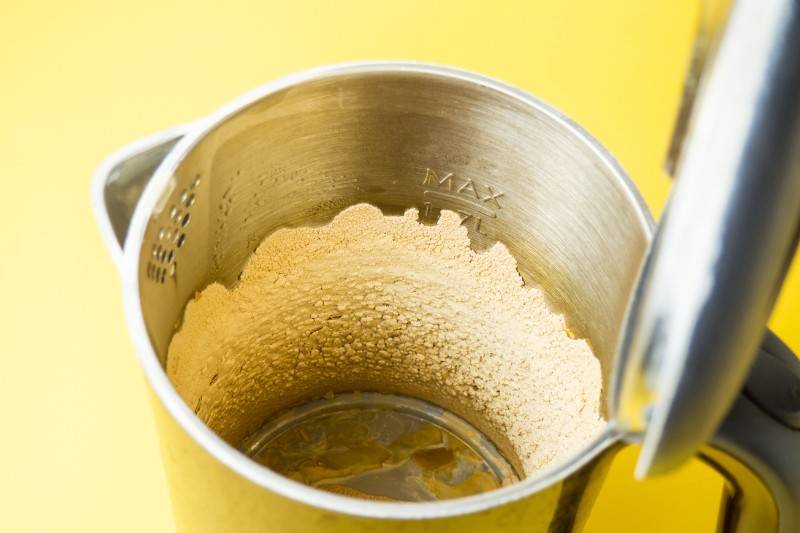
This is possibly one of the most common uses for citric acid in households. Your kettle will probably suffer from the biggest build-up of limescale if you have particularly hard water.
You can create magic, though, when you add this ingredient to hot water.
That’s when the acid will attack the limescale and completely dissolve it.
Simply open the top of the kettle and then fill it to the level where you can see hard water stains along the sides. Then add one or two teaspoons of citric acid and bring the kettle or coffee pot to a boil.
Now rinse it out and see if there’s still any staining left. You might need to repeat this a couple of times, but it will leave it sparkling clean.
2. Removing Grime and Build Up From Your Dishwasher
Another problem with hard water is that detergents don’t fully dissolve in it. This can lead to soap scum building up that can become a breeding ground for bacteria and smells.
And this is where you get another one of the great uses for citric acid.
To fix this problem, simply add two teaspoons of citric acid powder and one teaspoon of baking soda to your dishwasher and then run a hot cycle.
The citric acid and baking soda will get into every small part of the washing machine that you can’t see or get to. It will dissolve and remove soap scum effectively, leaving the inside of the machine perfectly clean.
In hard water homes, aim to do this every 30 cycles, and your machine will last a lot longer.
3. Degunking Your Washing Machine
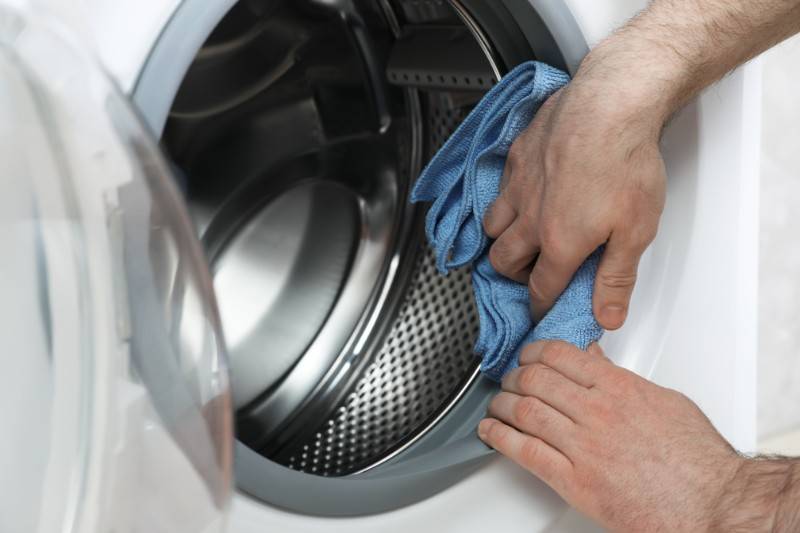
Your washing machine can suffer the same fate as your dishwasher, but the build-up of limescale and laundry detergents tends to do more damage to a washing machine.
The solution is the same one that you’d use for your dishwasher.
Two teaspoons of citric acid powder and one teaspoon of baking soda in an empty hot cycle every 2 to 4 weeks should do the job.
The citric acid and baking soda won’t just be effective at removing soap scum but will also attack mineral deposits.
A common fate of washing machines is that the heating element fails because of too much limescale, and this tip will resolve that. Or, you can create your very own DIY washing machine cleaner.
4. Removing Limescale From Your Faucets and Sinks
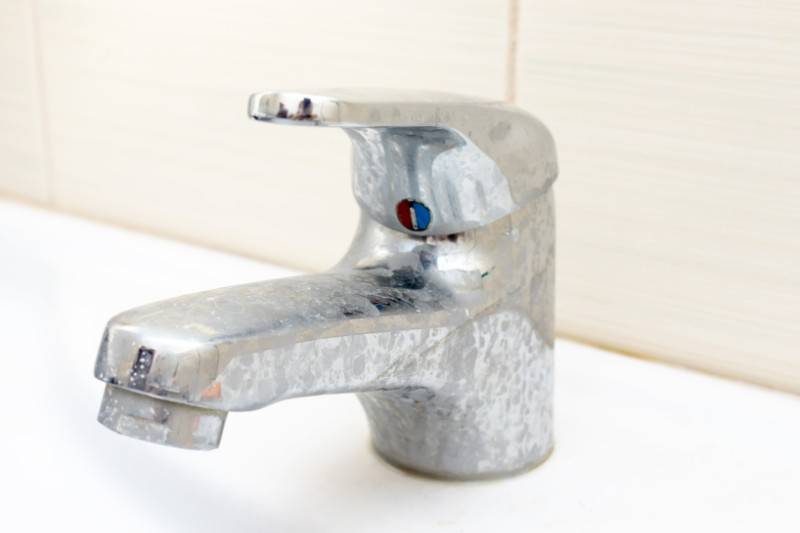
Most people just buy a spray bottle of limescale remover and never look at the chemicals in it. Not only are they harmful to the environment and possibly your health, but they often don’t work as well as citric acid.
One of my favorite uses for citric acid is to keep all the faucets shiny.
To use citric acid for cleaning all the sinks and faucets in your home, just put two tablespoons of it in a pint of warm water. Fill a spray bottle with the resulting mixture, and you’re good to go.
Spray it on the faucets and sinks and let it work for 20 seconds before wiping away any limescale build-up.
5. Getting Rid of Hard Water Stains From Your Toilet Bowl

Your toilet bowl is another area where you’ll notice a gradual build-up of water stains. No matter how hard you scrub, they seem to be impossible to remove.
To remove these stains, use the same mix as for your faucets and spray it onto the toilet bowl every time you clean it. If the stained areas in the toilet bowl don’t seem to come away easily, then you might need to clean with citric acid in a stronger solution.
One of the uses for citric acid I recommend for heavy staining or mineral build-up is to double or triple the strength of the citric acid solution for those tough areas.
Once it’s clean, simply keep using the regular solution every week, and you won’t have this problem again.
6. Disinfecting Surface Areas in Your Home
Citric acid is also a potent antimicrobial, so you should favor this green cleaner for other areas in your home like kitchen counters, tables, or other surfaces where you eat or prepare food.
To disinfect those surfaces in your home, simply mix a few spoonful of it with warm water in a spray bottle, add a few drops of essential oils, and your home will smell as clean as it is.
It’s one of those uses for citric acid that can deep clean your home and leave it smelling naturally fresh without any danger from chemicals.
7. Polishing up Stainless Steel Equipment and Surfaces
This is another one of the great uses for citric acid that most people don’t think of.
If you have some stainless steel surfaces and kitchen appliances, then you’ll inevitably splash them with hot water leaving some hard water deposits.
Those mineral deposits are ugly, and with many chemical limescale removers, you might end up doing damage to the stainless steel surface.
Instead, spray on some citric acid cleaner and use a microfiber cloth to polish it. It’s a non-toxic polish that will leave things shining.
8. Deep Cleaning Toaster Oven Racks
Here is another one of the great uses for citric acid. When hot water and dish soap won’t do the job of fully cleaning your toaster oven racks, then don’t resort to using specialty chemical cleaning products. Instead, choose a green cleaning product.
Leave the racks to soak in hot water and citric acid for an hour, and then use some steel wool to scrub them clean.
The acid should gradually attack the carbonized food, making this an effective cleaner for even the most hated cleaning jobs.
If this is something you haven’t done in a long time, then you may need to repeat the process a few times.
9. Descaling a Water Heater
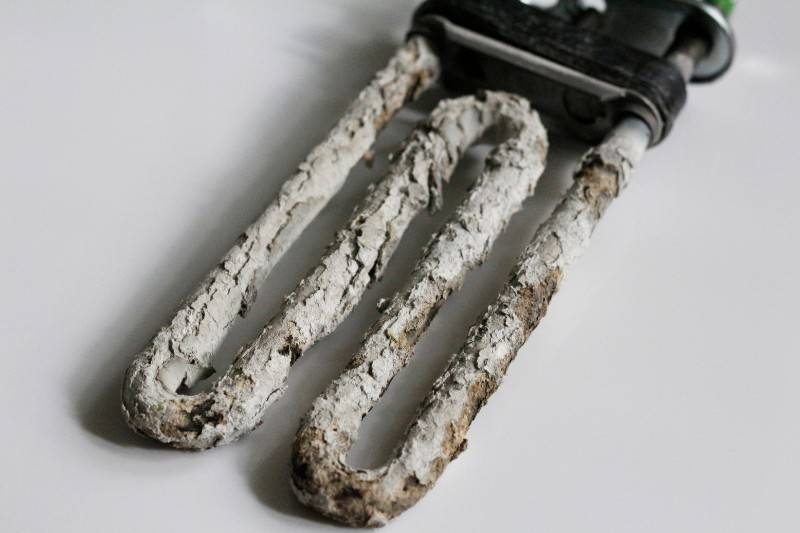
Hard water deposits don’t just build up in your coffee pot and kettle. Over the years, they will build up in a hot water heater, and it will become less effective and possibly even break down.
And one of the uses for citric acid is to clean out your hot water heater, but it takes a bit more effort.
First of all, plan this for a day where you won’t need the hot water heater for several hours.
Add ten ounces of citric acid to the cold water inlet and let it sink to the bottom, and dissolve. Then heat the water and let the acid do its magic on the mineral deposits for 4-8 hours before completely draining the tank.
10. Cleaning Shower Heads
And the final one of my recommended uses for citric acid is to remove limescale and calcium deposits from shower heads.
If you notice that some of the small nozzles on the shower head don’t spray water anymore, then remove the shower head and place it in a bowl.
Pour a teaspoon of citric acid into the shower head, and then slowly fill the bowl with hot water.
Leave the shower head to soak for an hour and then rinse it out with cold water, and it should be looking like new again.
How Citric Acid Works
Citric acid is like the superhero of natural cleaning. It swoops in with its secret weapon—breaking down the tough bonds that hold dirt and grime together.
So, what makes it so special?
At its core, citric acid is an organic acid with a super low pH, which means it’s perfect for tackling alkaline substances like those annoying soap scum stains or hard water spots. When it gets to work, it dissolves minerals, fats, and other stubborn residues, making them easy to rinse away.
But wait, there’s more! Citric acid doesn’t just clean—it fights bacteria too. By creating an unfriendly environment for germs, it keeps things fresh and hygienic. This one-two punch of degreasing and disinfecting makes it a powerhouse for eco-friendly cleaning.
Should You Use Citric Acid?
Citric acid is the unsung hero of eco-friendly cleaning. Got hard water stains on your showerhead? A coffee machine in need of a refresh? Or maybe a dishwasher that smells less than fresh? Citric acid’s got you covered! Plus, it’s natural, biodegradable, and perfect for anyone aiming to keep things green without skimping on sparkle.
But hold on—it’s not a magic wand for every mess. Protein stains like egg or blood? That’s a job for enzymatic cleaners. And if you’ve got fancy marble or granite countertops, steer clear. Citric acid’s acidity can leave them looking dull and etched. A pH-neutral cleaner is the better choice for those delicate surfaces.
The key? Know your cleaning battles. When it comes to everyday grime, citric acid is a rockstar. For trickier stains or sensitive surfaces, there’s always a perfect product waiting in the wings.
Is Citric Acid Safe for Cleaning?
Citric acid is the MVP of eco-friendly cleaning—safe, simple, and seriously effective.
It’s naturally derived, biodegradable, and won’t fill your home with nasty chemicals. Unlike those commercial cleaners that unleash VOCs (volatile organic compounds) into the air, citric acid keeps things fresh and non-toxic. It’s a win-win, especially if you’ve got kids, pets, or just want to breathe a little easier.
But hey, even superheroes need a little respect. Use citric acid in a well-ventilated area, and if your skin is on the sensitive side, gloves are your best friend.
With its eco-friendly vibe and easy-going nature, citric acid is a no-brainer for anyone looking to keep their home clean and green.
Does Citric Acid Damage Surfaces?
Citric acid is like the Swiss Army knife of household cleaners—versatile and effective! But before you start scrubbing away, it’s key to know which surfaces love it and which don’t.
For starters, it’s a champ on glass, stainless steel, ceramic, and plastics. Think of all those water spots and soap scum in your kitchen and bathroom—it’s like citric acid’s personal mission to make them disappear.
But not everything is citric acid-friendly. Natural stones like marble or granite? Big nope! Its acidic nature can dull their polished look. And wooden surfaces? They’re not fans either—it can strip their natural oils and leave them looking worse for wear.
Now, when it comes to metals, citric acid shines! It zaps rust off steel and brings a sparkle to copper. Just steer clear of aluminum—it can cause corrosion and pitting faster than you can say “oops.”
Pro tip: Always do a spot test in a hidden corner. Trust me, your surfaces will thank you.
How Often to Clean with Citric Acid
Citric acid is your friend for a cleaner home—minus the harsh chemicals. Whether it’s tackling high-traffic spots or giving appliances a refresh, it’s perfect for a sustainable cleaning routine.
In the kitchen and bathroom, a weekly once-over with citric acid keeps limescale and grime at bay. For your trusty coffee maker or dishwasher, a monthly deep clean can work wonders by clearing out mineral deposits and keeping them running smoothly.
Got faucets and showerheads looking a little sad? A quarterly treatment with citric acid will have them shining like new—and bacteria won’t stand a chance.
By making citric acid part of your regular cleaning schedule, you’re not just keeping things clean—you’re making a greener choice for your home and the planet.
Talk about a win-win!
The Do's and Don'ts When Using Citric Acid as a Cleaner
Thinking of adding citric acid to your eco-friendly cleaning toolkit?
Smart move! But before you start scrubbing, let’s go over some do’s and don’ts to keep things safe and effective.
Do’s
Don’ts
- Wear gloves when handling citric acid, especially if you have sensitive skin or cuts.
- Test first: Spot-check new surfaces to avoid potential damage.
- Use warm water: Mix citric acid with warm water for better solubility and cleaning power.
- Label and store properly: Keep pre-mixed solutions in labeled spray bottles, out of reach of kids and pets.
- Rinse thoroughly: Wash surfaces with water after cleaning to remove any residue.
- Add essential oils for extra antibacterial properties and a fresh scent.
- Dilute wisely: Use a weaker solution for regular cleaning; save stronger mixes for tough jobs.
- Skip the surface check: Avoid using citric acid on marble, granite, or other natural stones—it can etch the surface.
- Mix with bleach: This combination releases harmful gases.
- Forget grout care: Test colored grout first to prevent discoloration.
- Neglect ventilation: Even non-toxic cleaners need fresh air for safe use.
- Dump without diluting: Dispose of leftover solutions responsibly by diluting them first.
5 Best Citric Acid Cleaning Products
If you want to use a natural cleaner to degunk and disinfect your household items but you don’t want to sacrifice your lemons to the cause (because lemonade is amazing), then you should get these products instead.
All of them have citric acid — meaning you can have your lemon and eat it too.
1. Citra Solv Natural Cleaner & Degreaser Concentrate
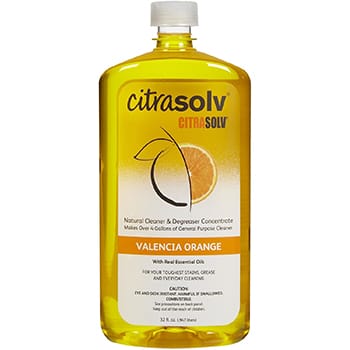
This is one of the most concentrated natural green cleaners available in the market today. It allows for countless uses in pure or diluted form to clean practically every part of your house.
People also love the fresh smell of citrus fruits that it leaves behind.
The main advantage is that you don’t have to dissolve the citric acid powder and try to figure out the ideal concentration. I’ve used it for cleaning everything from my floors to the BBQ grill, and the small bottle seems to last for a very long time.
2. Milliard 100% Citric Acid
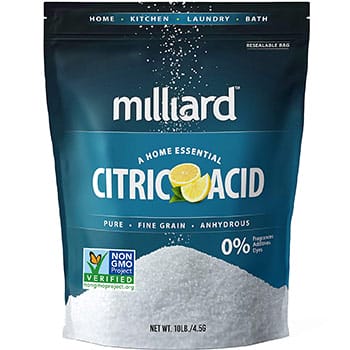
If you prefer mixing up your own concentrate, Milliard provides you with perfectly fine granules to make it easier to dissolve.
It comes in a large 10-pound bag, so you’ll have enough citric acid to keep you going for many months, even if you have a large home to keep clean. I also put a scoop of this in my washing machine every two weeks; despite having very hard water, the heating element stays limescale-free.
It’s also a food-grade product, so you could use it as a flavoring for homemade ice cream or candy.
3. Pure Organic Ingredients Citric Acid
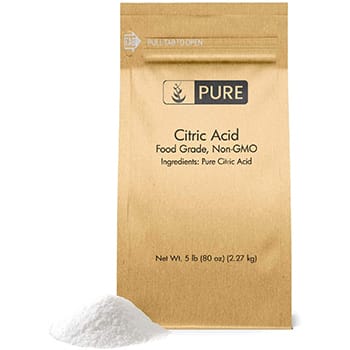
This Pure product is possibly one of the finer grain citric acids available. The benefit of this is that it’s easier to apply directly to tough limescale and gently lift the stains. You can even make a paste by mixing it with baking soda and just a few drops of water.
Also, as it’s organically sourced, it would provide added peace of mind if you plan to use it in food.
It’s ideal for making homemade ice cream, cakes, and candy. Because it’s such a fine powder, you won’t have to worry about it properly mixing with the food.
4. Lemi Shine Complete Dishwasher Bundle
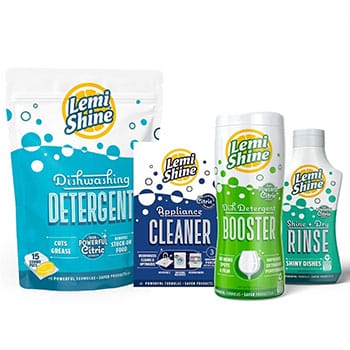
I love these Lemi Shine products as they come in four different containers at different concentrations.
Simply pick one of the products depending on whether you need to deep clean one of your appliances or just want to add some extra sparkle to your glasses in the dishwasher.
They come in convenient pods and will work wonders to cut through dirt and grime that builds up over time.
I simply set a reminder on my phone to put one of these in an appliance every two weeks, and they always stay fresh and clean-smelling.
5. Halefresh Citric Acid
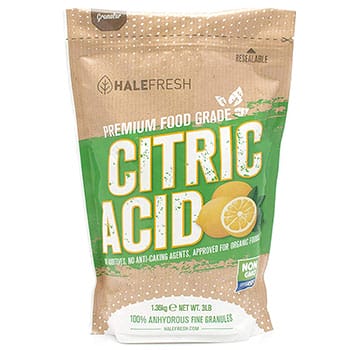
There are no unnecessary added anti-caking agents that might otherwise make it less effective. Simply mix it with warm water and essential oils, and enjoy the fresh smell it leaves behind.
I also find the pouch very convenient as it takes up less space on my cleaning product shelf in the pantry. And unlike other pouches, the seal closes perfectly every time to keep the granules dry and ready to use.
You can even use it for preserving or preparing food so let your imagination go with this citric acid.
Frequently Asked Questions (FAQ)
Yes, you can mix citric acid and vinegar, but it might be unnecessary. They both contain acids, but citric acid is more effective at dealing with limescale. Some folks also don’t like the smell of vinegar, preferring the fresh citrus scents.
Yes, citric acid is antibacterial and effectively deals with the most common household germs. It does this in a completely natural way where the acid attacks the outer membrane of bacteria and completely breaks them up.
Yes, citric acid can bleach clothes in high concentration. It’s not as potent as standard bleach, but you may want to be careful while cleaning. If you mix up a high concentration to deal with tough stains, then try to avoid contact with your clothes.
No, citric acid isn’t stronger than vinegar. The acetic acid in vinegar is a lot more aggressive and corrosive when it comes in contact with certain surfaces. But, there are many types of mineral deposits that citric acid can better deal with.
Yes, you can mix baking soda and citric acid, which is an effective combination for dealing with detergent deposits in appliances. The general recommendation is to aim for a 2:1 mix.
Yes, you can mix borax and citric acid. Some folks believe this is one of the best combinations for cleaning toilets.
Final Thoughts
Citric acid is not just a cleaning agent; it’s a commitment to eco-friendly living. Its versatility, safety, and effectiveness make it an excellent choice for those looking to reduce their environmental footprint without compromising on cleanliness.
Whether you’re tackling routine household tasks or addressing tougher grime, citric acid offers a natural, powerful solution. So why not give it a try?
Embrace this biodegradable powerhouse in your cleaning arsenal and enjoy a home that sparkles with sustainability. Let’s clean consciously, for our health and the planet’s.

